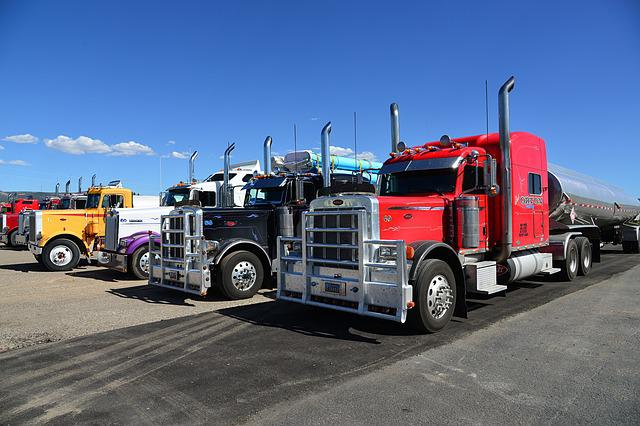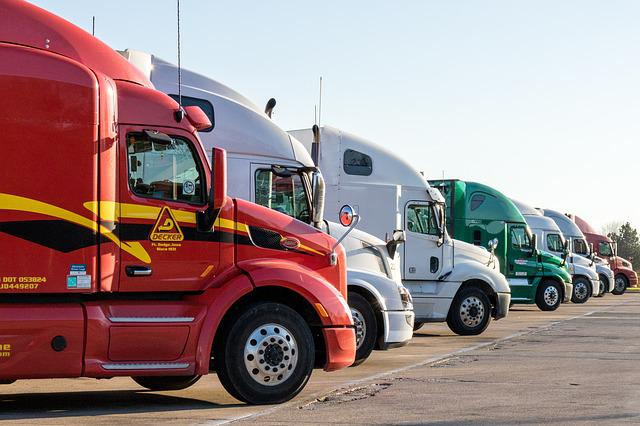What are Commercial Truck Loans?
Commercial truck loans are similar to other types of loans, except they are specifically for commercial trucks. Owner-operators and small businesses utilize commercial truck loans to finance the purchase of commercial vehicles. There are several options for commercial and semi-truck financing. Ongoing expenses for truck owners include insurance, maintenance, and fuel.
Various financing packages are available to fund commercial vehicles. This includes options for individual semi-trucks or fleet financing.
Equipment Loans
Equipment loans are the most common form of commercial truck loans. With an equipment finance strategy, the truck acts as collateral. If you default on the loan, the lender repossesses the truck.
Using the truck as collateral lowers the risk for the lender. Reducing the risk means you can usually borrow a higher amount with longer terms and reasonable interest rates. Most trucking business owners use an equipment loan because they typically offer the most advantages.
Since the collateral is built into the loan, you usually won’t have to add any additional collateral or business assets. Some semi-truck loans will require a down payment, while others do not. The equipment loan will cover 100% of the fair market value in many cases, but it depends on the lender, your financial strength, and the total amount you’re borrowing.
Here are some key facts to know about using this loan type for your commercial truck financing:
-
Up to $5 million per piece of equipment.
-
Loan terms are between 1 and 6 years.
-
Interest rates start at 3.5%
-
Funded in 3-10 business days.
Other Small Business Loans
In addition to using an equipment loan for commercial truck financing, you can use several small business loan types to purchase commercial trucks. The advantage of other small business loans is that you can use the funds for more than just buying the truck, and most can cover a wide range of business expenses. The downside is that, in most cases, you will need a personal guarantee or collateral, and the qualifications are more stringent.
If you want to pursue a non-equipment small business loan, here are the loan types to consider:
Commercial Truck Leasing
Leasing your commercial truck is essentially renting it. The lender holds the title, and you lose possession at the end of the lease term. The advantage of leasing is that you can usually get a lower monthly payment, and it’s less of a commitment. The disadvantage is that you don’t own the asset and, throughout the lease, could end up paying more than the total cost of ownership.
How does a Commercial Truck Loan work?
A commercial truck loan is a specialized type of vehicle financing specifically designed for the trucking industry. Most commercial truck loans are equipment loans, where the truck serves as collateral. In many ways, the financing process for a commercial truck loan works like an auto loan. Commercial truck financing typically refers to semi-trucks, but can also mean box trucks or pickup trucks used for business purposes.
First, you get the invoice for the commercial vehicle, or fleet of vehicles, so you know how much you need for the loan. Most lenders will ask you to provide the invoice for the purchase price of the truck. Invoices typically come from the dealership or transportation company selling the truck. You might need more verification for an invoice from a private party seller.
Next, you decide on a lender, complete the necessary paperwork, and submit your application. You might need to provide personal or business tax returns with your loan application, depending on the lender.
The application process for financing often requires detailed financial documentation to assess income and creditworthiness. Some truck financing options require a down payment. A down payment for a commercial truck purchase typically ranges from 10% to 30%, based on the truck’s cost and the borrower’s credit profile. Once approved, you’ll sign the financing agreement. The lender typically
At this point, it’s essentially like any other loan. You make fixed monthly payments, which include the principal, sales tax, interest, and fees, until the loan is fully repaid. Interest rates vary by lender and depend on multiple factors, including credit history and the truck’s model and mileage.
Multiple lenders provide commercial truck financing. Let’s look at some funding options available for commercial truck financing.
Traditional Banks
Some traditional banks, like Wells Fargo, PNC, and Bank of America, offer commercial truck financing. Like any lender, there are advantages and disadvantages to consider.
The advantage of working with a traditional bank is that it typically offers the best rates. Some people also enjoy the experience of meeting with their local banker to review the loan. The disadvantage of these lenders is that approval qualifications are often very high, and it takes longer to fund your loan. They usually require a down payment as well.
Commercial Truck Financing Companies
These lenders offer semi-truck financing options for the trucking industry. They primarily deal with commercial vehicle and commercial fleet financing programs. Small business owners should be aware that they typically require a down payment.
Like traditional banks, the approval qualifications are high, and funding times can run longer. You’ll typically need good credit, no tax liens, and high annual revenue to qualify. Direct commercial truck loan companies include CAG Truck Capital, Commercial Fleet Financing, and Truck Lenders USA.
Alternative Online Lenders
Online lenders (and marketplaces like United Capital Source) are a good option for small businesses needing quick approval and funding. They can typically process loans for owner-operators or small businesses with fair credit, or those that haven’t been in business for the required length by other lenders. We’ll look at the exact requirements next.
How can you get Semi-Truck Financing?
Different lenders will have varying qualification requirements for credit approval. In general, most commercial truck lenders require a good credit score, no tax liens, and cash flow that shows your business can afford the monthly payment for the loan.
Semi-Truck Equipment Loan Qualifications
With an Equipment loan, the commercial truck is the collateral, typically lowering the requirements for approval. Here are the qualifications you need to meet for an equipment loan:
-
Minimum credit score: 600
-
Time in business: at least 1 year
-
Minimum annual revenue: $250,000
How to Apply for a Commercial Truck Equipment Loan:
The application process is relatively fast, and you can apply directly through our one-page application in just a matter of minutes. Or reach out to one of our loan experts to guide you through the process.
Step 1: Make sure the commercial truck is the right purchase for your business.
There are two primary goals during this step: ensuring the truck is suitable for you and for the lender. Can the truck handle the usage necessary for your business? Does the truck hold value to the truck lender to justify using it as collateral?
Lender-friendly trucks are typically purchased from a reputable dealer, are less than 10 years old, and have fewer than 600,000 miles on them. The newer and lower mileage, the better, since the lifetime value of the commercial truck directly impacts the loan.
Step 2: Gather your documentation.
When applying for a semi-truck equipment loan, you need to provide the following:
-
Driver’s license.
-
The invoice for the truck or fleet.
-
Voided check.
-
Bank statements from the past three months.
-
VIN for the commercial truck.
Step 3: Complete the application.
Visit our application page or contact us by phone for more information.
Step 4: Speak to a representative.
After we receive your application, a senior account executive will reach out to you. The account executive will discuss your business needs and focus on your commercial truck equipment financing options and fixed-term business loan offers. We offer complete transparency, with no hidden fees or surprises.
You’ll get a complete breakdown of loan amounts, terms, interest rates, and fees. Once you have all the information, you can make an informed decision about your commercial truck loan.
Step 5: Get approved.
Your equipment loan is approved when your application meets underwriting requirements and receives credit approval. Next, the money is paid to the seller to settle the invoice. The lender retains the title with you until you have paid off the loan. We can help you set up automatic payments, or you can arrange to pay by check or electronic payment.
What are the benefits of Commercial Truck Financing?
Commercial truck financing provides a practical path to business growth by making it easier to acquire expensive vehicles without having to pay the full cost upfront. It helps preserve working capital, allowing businesses to maintain liquidity for operations or unexpected expenses.
Many financing options use the truck itself as collateral, which can ease qualification requirements and reduce risk for lenders. This setup enables faster access to funds and competitive interest rates, especially for well-qualified borrowers.
Financing also allows business owners to take advantage of tax deductions through Section 179 and depreciation benefits, and they may gain ownership of a valuable asset that retains its resale value.
What are the drawbacks of Commercial Truck Financing?
While commercial truck financing can be an excellent tool for growth, it also comes with potential downsides. Borrowers with poor credit or newer businesses may face higher interest rates, stricter terms, or require larger down payments.
Loan agreements may include personal guarantees or liens on business assets, increasing financial exposure if the business faces challenges. Monthly loan payments are fixed, meaning they must be paid regardless of seasonal income fluctuations or unexpected costs.
Additionally, ownership comes with the responsibility of maintenance, repairs, and depreciation, which can ultimately reduce the asset’s long-term value. Some loans may also have prepayment penalties.
Commercial Truck Financing Pros & Cons
Pros:
-
Preserves working capital.
-
Easier qualification using a truck as collateral.
-
Ownership of a long-term business asset.
-
Tax benefits through Section 179 and depreciation.
-
Faster funding with flexible terms.
Cons:
-
Higher rates for bad credit or startups.
-
Possible personal guarantees or asset liens.
-
Ongoing maintenance and depreciation costs.
-
Fixed monthly payments can strain cash flow.
-
Might require a substantial down payment.
Frequently Asked Questions
Here are the most common questions asked about commercial truck loans.
What are the other expenses of Commercial Truck Ownership?
The total cost of ownership for trucks encompasses expenses such as insurance, maintenance, and fuel. It is essential to include all costs associated with truck ownership in your business plan.
Can first-time buyers get Commercial Truck Financing?
Many financing options are available for first-time buyers, including loans, leases, and dealer financing. You should secure a business license before approaching a bank or lender. However, it’s easier for existing transportation companies to obtain funding.
Having your documents in order demonstrates your readiness for a significant purchase. Your lender will assess the truck’s condition and quality when determining your financing approval. First-time buyers may receive a higher APR (annual percentage rate).
Is it better to finance or lease a Semi-Truck?
The answer to this question depends on your specific business needs, your budget, and the condition of the semi-truck itself. Commercial truck loans are often the optimal choice, but leasing has its advantages as well.
Let’s look at the differences between a commercial truck loan and a lease option.
Commercial Truck Financing
The obvious advantage here is that you ultimately own the truck. Commercial trucks can sometimes log millions of miles before breaking down. Once you pay the semi-truck loan off, you’re mainly driving profit with your truck, minus fuel and maintenance costs, of course.
Commercial Truck Leasing
Leasing a commercial truck may be a more suitable option for newer businesses or those with limited credit history. Startups, in particular, may need to lease initially, as most truck lenders are hesitant to issue loans to new businesses. The approval process is typically fast and less stringent. However, you won’t own the truck at the end of the financing term. Additionally, there may be other rules, such as mileage restrictions.
Can I finance a Semi-Truck with bad credit?
While securing business funding with bad credit is difficult, it is still possible. Some lenders specialize in helping businesses with bad credit get funded. Owner-operators can secure financing for trucks by demonstrating consistent monthly revenue, which can aid in obtaining financing, even with poor credit.
A bad credit score will likely result in higher borrowing rates, making it more challenging to obtain favorable terms. There are some things you can do to help offset lower credit scores:
-
Offer additional collateral.
-
Make a down payment.
-
Get a co-signer.
-
Demonstrate high revenue and excellent cash flow.
What credit score do I need to Finance a Semi-Truck?
The minimum credit score for an equipment loan with United Capital Source is 600. Traditional banks and direct lenders often require a credit score of 660 or better for the best terms. CAG Truck Capital offers loan programs for small businesses with poor or limited credit scores. Consulting with financial experts can help owner-operators effectively navigate and select the most suitable financing options.
What are the other Semi-Truck Financing requirements I need to know?
Your specific loan may have additional requirements beyond credit scores, revenue, and years in business. Establishing an LLC or corporation before applying can increase your chances of approval.
Here are some issues we’ve encountered with semi-truck financing.
Commercial Driver’s License (CDL)
Most lenders do not require a CDL for approval, but it is recommended to check with the lender before applying.
Commercial Truck Insurance
You will need to carry insurance for your commercial truck. Most loans require at least liability coverage.
Lender-Friendly Trucks
Lenders will need to evaluate the truck when determining your loan. They need to estimate the truck’s value since it is the collateral for the loan (in most cases). Be prepared to provide:
-
The Vehicle Identification Number (VIN)
-
Year, make, and model.
-
Previous owners, if used.
-
The seller’s information.
Commercial Truck Financing – Final Thoughts
There are several key considerations that go into buying or leasing a new commercial vehicle. You want to ensure you get the best truck for your business at the best rate possible. It’s a delicate balancing act between what you need and what the company can afford. Making your decision requires knowing or being able to estimate the lifetime value of the semi-truck.
Once you know the truck’s value to your business, you can shop for lending options. New companies or those with poor credit may consider leasing as a temporary option until they establish sufficient credit and a strong business history, making them eligible for more traditional financing options. Established companies with strong financials and excellent credit scores are likely to receive the best rates from traditional banks or direct lenders, but funding times may be longer.
Most small businesses that need a commercial truck fall somewhere in the middle. If you have been in business for over a year, have fair to good credit, and a decent level of revenue, alternative lenders may be your best option. It is easier to get approved, and you can typically receive your money within 3-10 business days.















